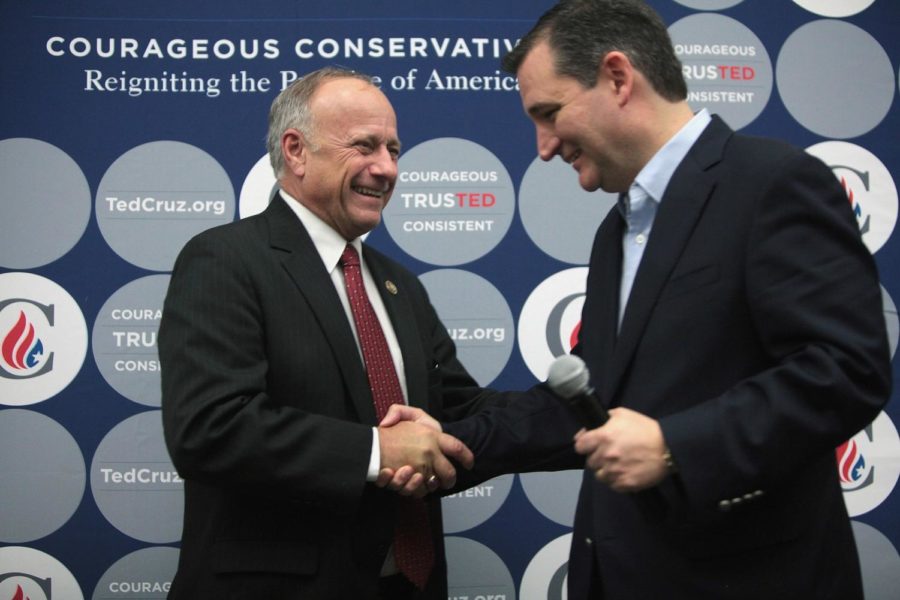The impact of political endorsements
Rep. Steve King endorsed Sen. Ted Cruz during the senator’s 2016 presidential campaign.
September 26, 2019
Campaign endorsements are used by various media outlets to measure the progress of a campaign for office, but the effect they have on success for a campaign may not be particularly high.
Endorsements come from a variety of sources. From current and former politicians to celebrities and even news media, all have different impacts on a campaign. Even within these categories there is nuance, for example the endorsement of a former president carries more weight than the endorsement of a state office holder.
Mack Shelley, Iowa State professor and chair of the political science department, said single sources — coming from either the media, a celebrity or political source — do not individually alter perceptions of candidates.
Shelley discussed the concept of an “opinion leader,” someone who packages information and shares it directly with their associated group. The group could be anything from a sports team, a group of friends or a religious organization. Opinion leaders have a far larger impact on someone’s political views than any celebrity does.
Individual political endorsements are the most commonly cited and the ones that are perceived to carry the most weight. Endorsements from senators, representatives and especially former presidents and vice presidents are touted by candidates and campaigns.
Sen. Amy Klobuchar, D-Minn., was endorsed by former Vice President Walter Mondale. Mondale described Klobuchar as a moderate progressive and said she is “a unifier.”
At Iowa State, the then-outgoing president of the College Democrats, Taylor Blair, senior in industrial design, endorsed Sen. Elizabeth Warren’s candidacy for the presidency in May when she visited the Memorial Union.
Celebrity endorsements receive a great deal of exposure in the age of social media. Due to the use of Twitter as an outlet for political speech, many celebrities have a direct means of communication with candidates. They can both critique and praise a politician’s viewpoints as they wish.
Celebrity endorsements may seem to have a large impact, however most Americans say Hollywood and entertainment industry endorsements don’t affect their choice of candidate.
So what purpose do endorsements from politicians really serve? On the surface they seem to lend weight to a candidate’s stances and might convince people to support a certain candidate. In reality these endorsements don’t move many votes — they solidify them. People are more likely to continue supporting someone if they see others support them.
Shelley said name recognition is important in gathering funds and donations for a campaign.
“Being in the public eye and news cycle is pretty much the lifeblood of politicians,” Shelley said.
Endorsements from news media may have the least impact on a candidate’s political campaign.
Shelley said “narrow-casting,” or the tendency of media to focus their content on a smaller specific audience — hurts the effect media could have on campaign numbers. The currently low opinion of news media in America and the competitive nature of news outlets also damages any impact media endorsements might have.
Political endorsements are just one facet of the extremely complex political process in America and their effects can often go unnoticed. They may not move many votes on their own, but they can play a large role in controlling the news cycle, reinforcing already held views or putting a candidates name in a voters head.

















